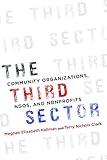The third sector : community organizations, NGOs, and nonprofits / Meghan Elizabeth Kallman, Terry Nichols Clark ; with assistance from Cary Wu and Jean Yen-Chun Lin.
Material type: TextLanguage: English Publisher: Urbana : University of Illinois Press, 2016Description: x, 251 pages : illustrations ; 24 cmContent type:
TextLanguage: English Publisher: Urbana : University of Illinois Press, 2016Description: x, 251 pages : illustrations ; 24 cmContent type: - text
- unmediated
- volume
- 9780252040436 (hbk.)
- 0252040430 (hbk.)
- 9780252098857 (e-book)
- Community organizations, NGOs, and nonprofits
- 301.34
- HM 766 K14t 2016
| Item type | Current library | Home library | Collection | Shelving location | Call number | Copy number | Status | Date due | Barcode |
|---|---|---|---|---|---|---|---|---|---|
 Libro
Libro
|
Biblioteca Juan Bosch | Biblioteca Juan Bosch | Ciencias Sociales | Ciencias Sociales (3er. Piso) | HM 766 K14t 2016 (Browse shelf(Opens below)) | 1 | Available | 00000124948 |
Includes bibliographical references (pages 227-247) and index.
Civil Society, Social Capital, and the Growth of the Third Sector -- The United States -- France -- Japan -- South Korea -- Taiwan -- China -- Looking Forward: Understanding Associations and Trust Patterns -- Conclusion: Global Themes
Civil society organizations, nonprofits, national and international nongovernmental organizations, and a variety of formal and informal associations have coalesced into a world political force. Though the components of this so-called third sector vary by country, their cumulative effects play an ever-greater role in global affairs. Looking at relief and welfare organizations, innovation organizations, social networks, and many other kinds of groups, Meghan Elizabeth Kallman and Terry Nichols Clark explore the functions, impacts, and composition of the nonprofit sector in six key countries. Chinese organizations, for example, follow the predominantly Asian model of government funding that links their mission to national political goals. Western groups, by contrast, often explicitly challenge government objectives, and even gain relevance and cache by doing so. In addition, Kallman and Clark examine groups in real-world contexts, providing a wealth of political-historical background, in-depth consideration of interactions with state institutions, region-by-region comparisons, and suggestions for how groups can borrow policy options across systems. Insightful and forward-seeing, The Third Sector provides a rare international view of organizations and agendas driving change in today's international affairs. -- Provided by publisher.


There are no comments on this title.